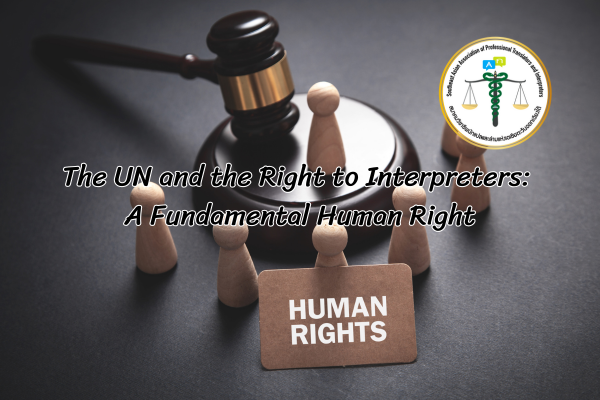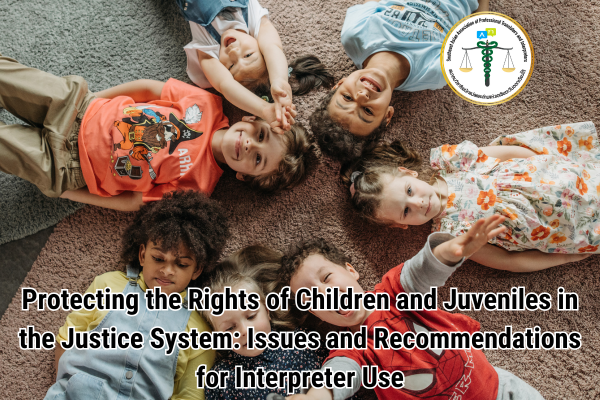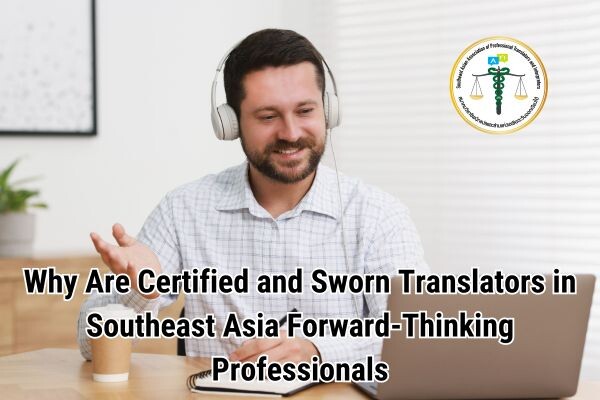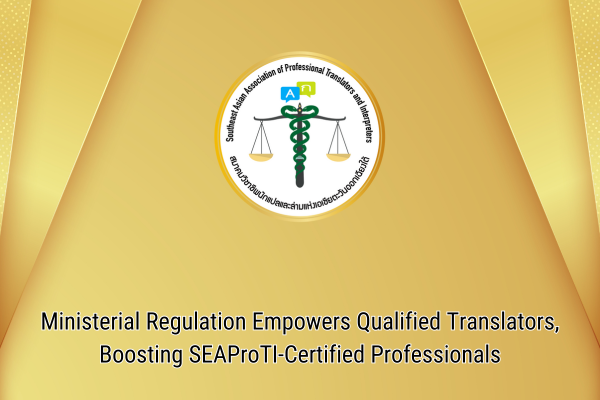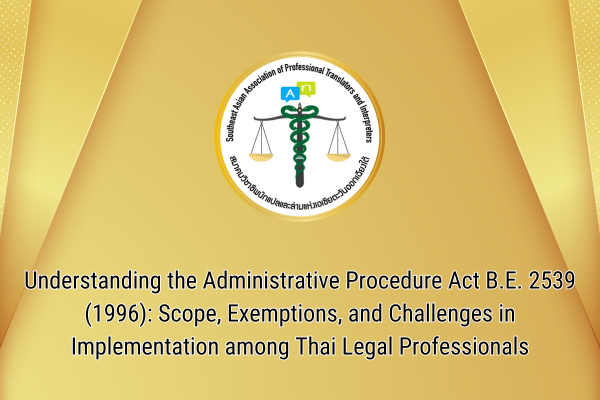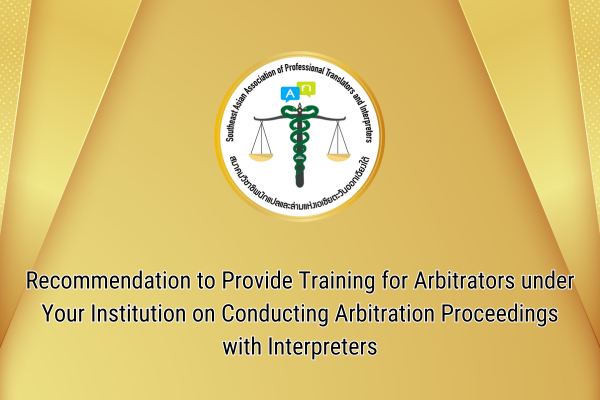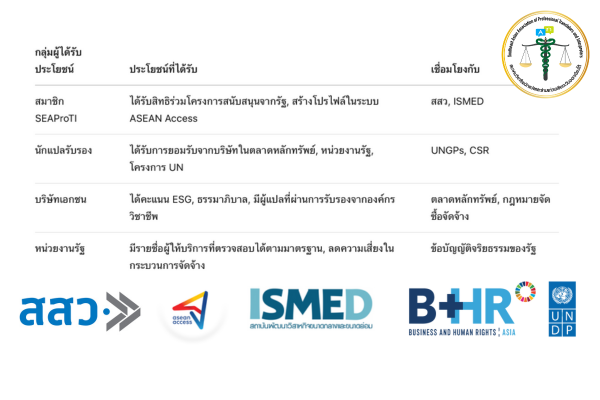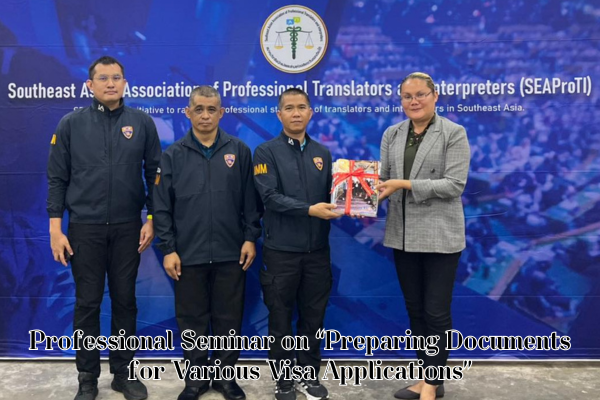The United Nations and the Right to Interpreters: A Fundamental Human Right
16 December 2024, Bangkok – Language is a critical tool for communication, expression, and access to justice, healthcare, and public services. The United Nations (UN) recognizes this fact and has enshrined the right to interpreters in various international legal frameworks. These rights aim to protect the dignity and inclusion of individuals, especially those with language barriers or disabilities. However, despite these global standards, many countries, including Thailand, face significant challenges in meeting these obligations. This article explores the legal foundations of the right to interpreters, their significance, and Thailand’s ongoing struggle to implement these provisions effectively.
The Legal Foundations of the Right to Interpreters
1. UN Convention on the Rights of Persons with Disabilities (CRPD)
The CRPD, adopted in 2006, is a landmark treaty emphasizing accessibility for persons with disabilities. Several articles directly address the need for interpretation services:
-
Article 9: Accessibility requires states to ensure access to communication, including professional interpreters and assistive technologies.
-
Article 21: Freedom of Expression and Opinion, and Access to Information mandates the promotion of sign languages, braille, and other accessible formats, ensuring individuals can communicate effectively.
-
Article 13: Access to Justice emphasizes the need for procedural accommodations, including qualified interpreters, to enable full participation in legal proceedings.
2. International Covenant on Civil and Political Rights (ICCPR)
Adopted in 1966, the ICCPR includes a specific provision on interpretation:
-
Article 14(3)(f): Rights of Accused Persons guarantees the right to free assistance of an interpreter if a person does not understand or speak the language used in court. This is essential to ensure fairness and the right to a fair trial.
3. Universal Declaration of Human Rights (UDHR)
Although non-binding, the UDHR underpins many international human rights treaties:
-
Article 10: Right to a Fair Trial implies the necessity of interpretation to ensure individuals understand legal processes and outcomes.
Together, these frameworks establish a robust international obligation for states to provide qualified interpreters in various settings, including legal proceedings, public services, and healthcare.
The Importance of Qualified Interpreters
Qualified interpreters play a crucial role in:
-
Ensuring Fair Trials: Individuals who cannot understand the language of legal proceedings are at a significant disadvantage. Interpreters bridge this gap, ensuring justice is not denied.
-
Supporting Disability Rights: For the deaf community, sign language interpreters are essential for accessing information, education, and public services.
-
Facilitating Healthcare Access: Language barriers in healthcare can lead to misunderstandings, misdiagnoses, and inadequate care. Professional interpreters help mitigate these risks.
-
Promoting Social Inclusion: By enabling communication, interpreters foster greater participation in society, reducing marginalization and discrimination.
The quality of interpretation is critical. Poorly trained or unqualified interpreters can lead to miscommunication, jeopardizing outcomes in sensitive areas such as legal trials or medical consultations.
Thailand’s Obligations and Challenges
Thailand’s International Commitments
Thailand has ratified both the CRPD and the ICCPR, thereby committing to uphold the right to interpreters. Domestically, the country has made strides in improving accessibility, including recognizing Thai Sign Language as the national sign language in 1999 and establishing legal aid centers to support marginalized communities. However, significant gaps remain.
Shortage of Qualified Interpreters
One of the most glaring issues in Thailand is the acute shortage of qualified interpreters. This problem is particularly evident in the following areas:
-
Legal System:
-
Many accused persons who do not speak Thai, including members of ethnic minorities and migrant workers, are often left without adequate interpretation during trials. This violates their right to a fair trial under Article 14 of the ICCPR.
-
In some cases, interpreters provided by the courts lack the necessary legal training, leading to errors and misunderstandings that undermine the justice process.
-
-
Support for Persons with Disabilities:
-
While Thailand has made efforts to train sign language interpreters, the number remains insufficient to meet the demand. This leaves many members of the deaf community without access to critical services.
-
-
Healthcare:
-
Migrant workers, who constitute a significant portion of Thailand’s workforce, often face language barriers when seeking medical care. Hospitals frequently rely on ad hoc or untrained interpreters, resulting in communication gaps that can compromise patient safety.
-
Systemic Barriers
Several systemic barriers exacerbate the lack of qualified interpreters in Thailand:
-
Insufficient Training Programs:
-
Interpreter training programs are limited in number and scope, with few institutions offering specialized courses in legal or medical interpretation.
-
-
Low Pay and Recognition:
-
Interpreters in Thailand often receive low wages and limited recognition, discouraging individuals from pursuing this profession.
-
-
Lack of Government Oversight:
-
There is no standardized certification system for interpreters in Thailand, leading to inconsistencies in the quality of services provided.
-
The Human Impact
The lack of qualified interpreters in Thailand has far-reaching consequences:
-
Denial of Justice:
-
Ethnic minorities and migrant workers are disproportionately affected. For example, reports have highlighted cases where non-Thai speakers were convicted without fully understanding the charges or evidence presented against them due to inadequate interpretation.
-
-
Exclusion of the Deaf Community:
-
Many deaf individuals report feeling excluded from society due to the lack of accessible communication services. This limits their ability to participate in education, employment, and civic life.
-
-
Healthcare Inequities:
-
Language barriers in hospitals and clinics often lead to delayed diagnoses and improper treatment, particularly for migrant workers who rely on these services.
-
Recommendations for Improvement
To address these challenges, Thailand must take the following steps:
-
Expand Interpreter Training Programs:
-
Invest in specialized training programs for interpreters in legal, medical, and social service settings.
-
-
Establish Certification Standards:
-
Develop a standardized certification system to ensure interpreters meet minimum competency requirements.
-
-
Increase Funding and Recognition:
-
Provide competitive salaries and career advancement opportunities to attract and retain qualified interpreters.
-
-
Raise Awareness:
-
Conduct public awareness campaigns to highlight the importance of interpretation services and the rights of individuals who need them.
-
-
Strengthen Oversight:
-
Create a government body to oversee interpreter services, ensuring they meet international standards.
-
Conclusion
The right to interpreters is a fundamental human right recognized by the United Nations and enshrined in international law. It is essential for ensuring justice, accessibility, and inclusion for all individuals, regardless of their language or disability. While Thailand has made progress in recognizing this right, significant challenges remain, particularly in the legal system, healthcare, and support for persons with disabilities. By addressing these gaps and fulfilling its international obligations, Thailand can ensure that no individual is left behind due to a lack of communication support. This commitment is not just a legal obligation but a moral imperative to uphold the dignity and rights of all people.
About SEAProTI’s certified translators, translation certification providers, and certified interpreters:
The Southeast Asian Association of Professional Translators and Interpreters (SEAProTI) has officially announced the criteria and qualifications for individuals to register as “Certified Translators,” “Translation Certification Providers,” and “Certified Interpreters” under the association’s regulations. These guidelines are detailed in Sections 9 and 10 of the Royal Thai Government Gazette, issued by the Secretariat of the Cabinet under the Office of the Prime Minister of the Kingdom of Thailand, dated July 25, 2024, Volume 141, Part 66 Ng, Page 100.
To read the full publication, visit: the Royal Thai Government Gazette
สหประชาชาติและสิทธิในการเข้าถึงล่าม: สิทธิมนุษยชนพื้นฐาน
ภาษาเป็นเครื่องมือสำคัญในการสื่อสาร การแสดงออก และการเข้าถึงกระบวนการยุติธรรม การดูแลสุขภาพ และบริการสาธารณะต่างๆ สหประชาชาติ (UN) ตระหนักถึงความสำคัญนี้และได้กำหนดสิทธิในการเข้าถึงล่ามในกรอบกฎหมายระหว่างประเทศต่างๆ เพื่อปกป้องศักดิ์ศรีและการมีส่วนร่วมของบุคคล โดยเฉพาะผู้ที่มีอุปสรรคทางภาษาและผู้พิการ อย่างไรก็ตาม แม้จะมีมาตรฐานระดับโลก ประเทศไทยและหลายประเทศยังคงเผชิญกับความท้าทายในการปฏิบัติตามข้อผูกพันเหล่านี้ บทความนี้จะสำรวจพื้นฐานทางกฎหมายของสิทธิในการเข้าถึงล่าม ความสำคัญ และความท้าทายของประเทศไทยในการดำเนินการตามข้อกำหนดนี้อย่างมีประสิทธิภาพ
พื้นฐานทางกฎหมายของสิทธิในการเข้าถึงล่าม
1. อนุสัญญาว่าด้วยสิทธิของคนพิการแห่งสหประชาชาติ (CRPD)
อนุสัญญา CRPD ซึ่งได้รับการรับรองในปี 2549 เป็นสนธิสัญญาสำคัญที่เน้นการเข้าถึงสำหรับคนพิการ โดยมีหลายข้อที่กล่าวถึงความจำเป็นในการให้บริการล่ามโดยตรง:
-
ข้อ 9: การเข้าถึง กำหนดให้รัฐต้องจัดให้มีการเข้าถึงการสื่อสาร รวมถึงล่ามมืออาชีพและเทคโนโลยีช่วยเหลือ
-
ข้อ 21: เสรีภาพในการแสดงความคิดเห็นและการเข้าถึงข้อมูล กำหนดให้รัฐส่งเสริมการใช้ภาษามือ อักษรเบรลล์ และรูปแบบการสื่อสารที่เข้าถึงได้ เพื่อให้บุคคลสามารถสื่อสารได้อย่างมีประสิทธิภาพ
-
ข้อ 13: การเข้าถึงกระบวนการยุติธรรม เน้นความจำเป็นในการจัดให้มีการปรับตัวในกระบวนการ เช่น ล่ามที่มีคุณสมบัติเหมาะสม เพื่อให้บุคคลสามารถมีส่วนร่วมได้อย่างเต็มที่
2. กติการะหว่างประเทศว่าด้วยสิทธิพลเมืองและสิทธิทางการเมือง (ICCPR)
กติกานี้ได้รับการรับรองในปี 2509 และมีบทบัญญัติที่เฉพาะเจาะจงเกี่ยวกับการตีความ:
-
ข้อ 14(3)(f): สิทธิของผู้ต้องหา รับประกันสิทธิในการได้รับความช่วยเหลือจากล่ามโดยไม่เสียค่าใช้จ่าย หากบุคคลนั้นไม่เข้าใจหรือพูดภาษาที่ใช้ในศาลได้ เพื่อให้มั่นใจว่ากระบวนการยุติธรรมเป็นธรรม
3. ปฏิญญาสากลว่าด้วยสิทธิมนุษยชน (UDHR)
แม้ว่าไม่ใช่ข้อผูกพันตามกฎหมาย แต่ UDHR ถือเป็นพื้นฐานของสนธิสัญญาสิทธิมนุษยชนหลายฉบับ:
-
ข้อ 10: สิทธิในการได้รับการพิจารณาคดีอย่างเป็นธรรม โดยนัยรวมถึงความจำเป็นในการตีความ เพื่อให้บุคคลเข้าใจกระบวนการและผลลัพธ์ของคดี
กรอบกฎหมายเหล่านี้ร่วมกันสร้างข้อผูกพันระหว่างประเทศที่ชัดเจนสำหรับรัฐในการจัดให้มีล่ามที่มีคุณสมบัติเหมาะสมในบริบทต่างๆ เช่น การพิจารณาคดี การให้บริการสาธารณะ และการดูแลสุขภาพ
ความสำคัญของล่ามที่มีคุณสมบัติเหมาะสม
ล่ามที่มีคุณสมบัติเหมาะสมมีบทบาทสำคัญใน:
-
การรับรองความเป็นธรรมในกระบวนการยุติธรรม: บุคคลที่ไม่สามารถเข้าใจภาษาของกระบวนการพิจารณาคดีได้จะเสียเปรียบอย่างมาก ล่ามช่วยเชื่อมช่องว่างนี้เพื่อให้มั่นใจว่าความยุติธรรมไม่ถูกปฏิเสธ
-
การสนับสนุนสิทธิของคนพิการ: สำหรับชุมชนคนหูหนวก ล่ามภาษามือเป็นสิ่งสำคัญสำหรับการเข้าถึงข้อมูล การศึกษา และบริการสาธารณะ
-
การอำนวยความสะดวกในการเข้าถึงการดูแลสุขภาพ: อุปสรรคทางภาษาในด้านการดูแลสุขภาพอาจนำไปสู่ความเข้าใจผิด การวินิจฉัยผิดพลาด และการดูแลที่ไม่เพียงพอ ล่ามมืออาชีพช่วยลดความเสี่ยงเหล่านี้
-
การส่งเสริมการรวมกลุ่มในสังคม: โดยการสนับสนุนการสื่อสาร ล่ามช่วยส่งเสริมการมีส่วนร่วมในสังคม ลดการกีดกันและการเลือกปฏิบัติ
คุณภาพของการตีความเป็นสิ่งสำคัญ ล่ามที่ขาดการฝึกอบรมหรือไม่มีคุณสมบัติที่เหมาะสมอาจนำไปสู่การสื่อสารที่ผิดพลาด ซึ่งส่งผลต่อผลลัพธ์ในด้านที่อ่อนไหว เช่น การพิจารณาคดีหรือการปรึกษาทางการแพทย์
ความรับผิดชอบและความท้าทายของประเทศไทย
พันธกรณีระหว่างประเทศของประเทศไทย
ประเทศไทยได้ให้สัตยาบันในทั้ง CRPD และ ICCPR ซึ่งหมายความว่าประเทศมีข้อผูกพันในการรับรองสิทธิในการเข้าถึงล่าม ในประเทศ ไทยได้พยายามปรับปรุงการเข้าถึง เช่น การยอมรับภาษามือไทยเป็นภาษามือแห่งชาติในปี 2542 และการจัดตั้งศูนย์ช่วยเหลือด้านกฎหมายเพื่อสนับสนุนชุมชนชายขอบ อย่างไรก็ตาม ยังมีช่องว่างสำคัญที่ต้องแก้ไข
การขาดแคลนล่ามที่มีคุณสมบัติเหมาะสม
หนึ่งในปัญหาที่เห็นได้ชัดเจนที่สุดในประเทศไทยคือการขาดแคลนล่ามที่มีคุณสมบัติเหมาะสม ซึ่งเป็นปัญหาในหลายด้าน:
-
ระบบกฎหมาย:
-
ผู้ต้องหาหลายคนที่ไม่พูดภาษาไทย รวมถึงสมาชิกของชนกลุ่มน้อยและแรงงานข้ามชาติ มักไม่ได้รับการตีความที่เหมาะสมในระหว่างการพิจารณาคดี ซึ่งเป็นการละเมิดสิทธิในการพิจารณาคดีที่เป็นธรรมตามข้อ 14 ของ ICCPR
-
ในบางกรณี ล่ามที่ศาลจัดหาให้ขาดการฝึกอบรมด้านกฎหมายที่จำเป็น ซึ่งนำไปสู่ข้อผิดพลาดและความเข้าใจผิดที่บั่นทอนกระบวนการยุติธรรม
-
-
การสนับสนุนคนพิการ:
-
แม้ประเทศไทยจะพยายามฝึกอบรมล่ามภาษามือ แต่จำนวนนั้นยังไม่เพียงพอต่อความต้องการ ทำให้สมาชิกในชุมชนคนหูหนวกหลายคนไม่สามารถเข้าถึงบริการที่สำคัญได้
-
-
การดูแลสุขภาพ:
-
แรงงานข้ามชาติ ซึ่งเป็นสัดส่วนที่สำคัญของแรงงานในประเทศไทย มักประสบอุปสรรคทางภาษาเมื่อเข้ารับบริการทางการแพทย์ โรงพยาบาลมักพึ่งพาล่ามชั่วคราวหรือไม่ได้รับการฝึกอบรม ส่งผลให้เกิดช่องว่างในการสื่อสารที่อาจเป็นอันตรายต่อความปลอดภัยของผู้ป่วย
-
อุปสรรคเชิงระบบ
อุปสรรคเชิงระบบหลายประการทำให้ปัญหาการขาดแคลนล่ามที่มีคุณสมบัติเหมาะสมในประเทศไทยยิ่งรุนแรงขึ้น:
-
การฝึกอบรมไม่เพียงพอ:
-
หลักสูตรการฝึกอบรมล่ามมีจำนวนจำกัดและขาดความครอบคลุม โดยมีเพียงไม่กี่สถาบันที่เปิดสอนหลักสูตรเฉพาะทาง เช่น การตีความทางกฎหมายหรือการตีความทางการแพทย์
-
-
ค่าตอบแทนและการยอมรับต่ำ:
-
ล่ามในประเทศไทยมักได้รับค่าจ้างต่ำและไม่ได้รับการยอมรับอย่างเหมาะสม ซึ่งเป็นการลดแรงจูงใจในการเข้าสู่อาชีพนี้
-
-
ขาดการกำกับดูแลของรัฐบาล:
-
ไม่มีระบบการรับรองมาตรฐานสำหรับล่ามในประเทศไทย ส่งผลให้เกิดความไม่สอดคล้องในคุณภาพของบริการที่มีให้
-
ผลกระทบต่อมนุษย์
การขาดล่ามที่มีคุณสมบัติเหมาะสมในประเทศไทยส่งผลกระทบในวงกว้าง:
-
การปฏิเสธความยุติธรรม:
-
ชนกลุ่มน้อยและแรงงานข้ามชาติเสียเปรียบมากที่สุด เช่น มีรายงานกรณีที่ผู้พูดภาษาอื่นถูกตัดสินว่ามีความผิดโดยไม่ได้เข้าใจข้อกล่าวหาหรือหลักฐานที่นำเสนออย่างถ่องแท้เนื่องจากการตีความที่ไม่เหมาะสม
-
-
การกีดกันชุมชนคนหูหนวก:
-
คนหูหนวกจำนวนมากรายงานว่ารู้สึกถูกกีดกันจากสังคมเนื่องจากขาดบริการการสื่อสารที่เข้าถึงได้ ซึ่งจำกัดความสามารถของพวกเขาในการเข้าถึงการศึกษา การจ้างงาน และการมีส่วนร่วมในชีวิตพลเมือง
-
-
ความเหลื่อมล้ำในระบบสุขภาพ:
-
อุปสรรคทางภาษาในโรงพยาบาลและคลินิกมักนำไปสู่การวินิจฉัยล่าช้าและการรักษาที่ไม่เหมาะสม โดยเฉพาะสำหรับแรงงานข้ามชาติที่ต้องพึ่งพาบริการเหล่านี้
-
ข้อเสนอแนะเพื่อการปรับปรุง
เพื่อแก้ไขปัญหาเหล่านี้ ประเทศไทยต้องดำเนินการดังต่อไปนี้:
-
ขยายโปรแกรมการฝึกอบรมล่าม:
-
ลงทุนในหลักสูตรการฝึกอบรมเฉพาะทางสำหรับล่ามในด้านกฎหมาย การแพทย์ และบริการสังคม
-
-
จัดตั้งมาตรฐานการรับรอง:
-
พัฒนาระบบการรับรองมาตรฐานเพื่อให้มั่นใจว่าล่ามมีคุณสมบัติตรงตามข้อกำหนดขั้นต่ำ
-
-
เพิ่มเงินทุนและการยอมรับ:
-
ให้ค่าตอบแทนที่แข่งขันได้และโอกาสก้าวหน้าในอาชีพเพื่อดึงดูดและรักษาล่ามที่มีคุณภาพ
-
-
สร้างความตระหนักรู้:
-
จัดทำแคมเปญสร้างความตระหนักรู้สาธารณะเกี่ยวกับความสำคัญของบริการล่ามและสิทธิของผู้ที่ต้องการบริการเหล่านี้
-
-
เสริมสร้างการกำกับดูแล:
-
จัดตั้งหน่วยงานของรัฐเพื่อกำกับดูแลบริการล่ามให้เป็นไปตามมาตรฐานสากล
-
บทสรุป
สิทธิในการเข้าถึงล่ามเป็นสิทธิมนุษยชนพื้นฐานที่ได้รับการยอมรับโดยสหประชาชาติและกำหนดไว้ในกฎหมายระหว่างประเทศ เป็นสิ่งสำคัญในการรับรองความยุติธรรม การเข้าถึง และการรวมกลุ่มของทุกคนโดยไม่คำนึงถึงภาษาและความพิการ แม้ประเทศไทยจะมีความก้าวหน้าในการตระหนักถึงสิทธินี้ แต่ยังมีความท้าทายที่สำคัญ โดยเฉพาะในระบบกฎหมาย การดูแลสุขภาพ และการสนับสนุนคนพิการ ด้วยการแก้ไขช่องว่างเหล่านี้และปฏิบัติตามพันธกรณีระหว่างประเทศ ประเทศไทยสามารถมั่นใจได้ว่าจะไม่มีใครถูกละทิ้งเนื่องจากการขาดการสนับสนุนด้านการสื่อสาร นี่ไม่ใช่แค่ข้อผูกพันทางกฎหมาย แต่ยังเป็นหน้าที่ทางศีลธรรมในการรักษาศักดิ์ศรีและสิทธิของทุกคน
เกี่ยวกับนักแปลรับรอง ผู้รับรองการแปล และล่ามรับรองของสมาคมวิชาชีพนักแปลและล่ามแห่งเอเชียตะวันออกเฉียงใต้
สมาคมวิชาชีพนักแปลและล่ามแห่งเอเชียตะวันออกเฉียงใต้ (SEAProTI) ได้ประกาศหลักเกณฑ์และคุณสมบัติผู้ที่ขึ้นทะเบียนเป็น “นักแปลรับรอง (Certified Translators) และผู้รับรองการแปล (Translation Certification Providers) และล่ามรับรอง (Certified Interpreters)” ของสมาคม หมวดที่ 9 และหมวดที่ 10 ในราชกิจจานุเบกษา ของสำนักเลขาธิการคณะรัฐมนตรี ในสำนักนายกรัฐมนตรี แห่งราชอาณาจักรไทย ลงวันที่ 25 ก.ค. 2567 เล่มที่ 141 ตอนที่ 66 ง หน้า 100 อ่านฉบับเต็มได้ที่: นักแปลรับรอง ผู้รับรองการแปล และล่ามรับรอง


